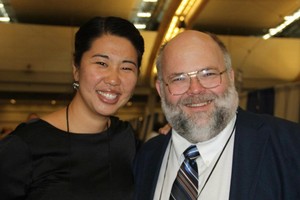 Saturday morning, 30 June, brought Riverside Conversations (beside the Allegheny just above its confluence with the Monongehala) at the 220 General Assembly (2012) of the Presbyterian Church (U.S.A.).
Saturday morning, 30 June, brought Riverside Conversations (beside the Allegheny just above its confluence with the Monongehala) at the 220 General Assembly (2012) of the Presbyterian Church (U.S.A.).
The Riverside Conversations is a pre-assembly experience for commissioners and advisory delegates. Commissioners and advisory delegates will begin engaging the key issues before the General Assembly, encountering each other and listening for God’s Spirit of discernment as a gathering body.
Irene Pak and I (the photo of us is by Bruce Reyes-Chow) led the conversation on Equipping the Church for Ministry with God’s Diverse Family. The description of the conversation is:
Sharing the gospel, nurturing disciples and building the church in today’s complex multi-cultural, multiracial society requires new skills. This conversation will focus on the tools and resources available to Presbyterians who seek to meet this challenge and continue the Presbyterian Church’s long standing commitment to address racism.
Participants had opportunities to talk with one another and listen to one another about their experiences of diversity. After a brief reflection on race and racism and the Presbyterian Church (U.S.A.)’s role in both perpetuating racism and challenging and dismantling racism, three stories were shared. Participants then had a second opportunity to listen and to talk as they reflected on what they had heard. They were encouraged to let their conversations of the morning be a beginning – and to continue the conversations during the Assembly and when they return home. Resources from the PC(USA) for antiracism work were shared.
The Presbyterian News Service posted the following story about the event:
The Presbyterian missionaries who started schools for the Native American tribes in Alaska in the late 1800s had the best of intentions. They would educate the children – teaching them about the American language, culture and faith. Over time, however, those good intentions led to a culture of oppression. As part of the Riverside Conversation on Equipping the Church for Ministry with God’s Diverse Family, the Rev. Curt Karns, executive presbyter of Yukon Presbytery, described the reconciliation work that has recently begun between the church and community of Gambell, an Alaskan town just 36 miles from Siberia. (KOENIG NOTE: Commissioned Ruling Elder Lucy Ann Apatiki, moderator of the session of the Gambell Presbyterian Church was also scheduled as a speaker but her plan from Gambell to the Alaskan mainland was cancelled because of fog.)
“The program began with good intentions, providing education for the children who lived in the area,” Rev. Karns says. “However, that education required assimilation. The Native Americans were forced to give up important parts of their cultural heritage. They were no longer permitted to speak in their native language or participate in drumming and dancing rituals considered to be pagan.”
As the decades passed, it became clear that the assimilation practices were hurting the very people they were created to help. Some felt shame for their own heritage and culture. Out of this shame came division, confusion and pain within families and within the community.
Recently, the Presbytery of Yukon began New Beginning, a reconciliation program called to heal the pain and demonstrate how today’s Alaskan Presbyterians value cultural diversity. The culminating reconciliation ceremony began with formal, written apologies that were officially presented to the clan leaders and ended with an entire gymnasium filled with many different kinds of people drumming and dancing in celebration. Rev. Karns says the work in Gambell really is a just a beginning. Reconciliation work with the Native Americans needs to be done all over Alaska and the United States. However, racial reconciliation is not limited to Native Americans.
Anne Rawlings, director of outreach and program administration at The Interfaith Center of New York, says that even though many strides against racism have been made, government and law-enforcement structures still work against many African Americans and Latinos as “stop and frisk” practices and jail sentencing tend to specifically target these minority groups.
“We need to be allies with the people who are targeted and oppressed. We need to work with them against the structures that marginalize them,” Rawlings says.
Healing the hurt of racism requires that those involved acknowledge the wrongs of the past, explains the Rev. Karen Battle, director of justice ministries and mission in Pittsburgh Presbytery. As part of the Amos 5:24 Ministry team, she has helped Pittsburgh churches recognize that past city and religious leaders had been slave owners and that racism – as well as a longing for justice – is in the DNA of many Pittsburgh organizations.
“The Presbyterian church here has been at both ends of the spectrum – with complicity to the sin of racism in the form of slavery as well as the redemption and reconciliation of abolitionists who worked within the denomination,” Battle says. “Racism has no place in the church.”
The conversation began with prayer, included a litany, and ended with a song of prayer – recognizing that God makes us for each other, shows us how to live in Jesus Christ, and gifts us for living through the Holy Spirit.